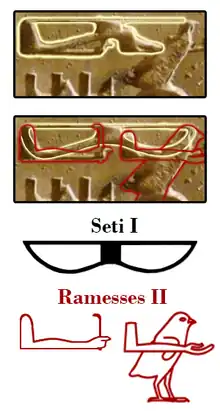
The helicopter hieroglyphs is a name given to part of an Egyptian hieroglyph carving from the Temple of Seti I at Abydos. It is a palimpsest relief with two overlapping inscriptions, the titles of Ramesses II superimposed on those of his predecessor Seti I. They have been wrongly interpreted as an out-of-place artifact depicting a helicopter and other examples of advanced technology, in pseudo-scientific ancient astronaut circles.[1]
The "helicopter", a product of pareidolia,[2] is made up of a bow hieroglyph of Seti I, and two arm hieroglyphs of Ramesses II.[3]
Translation
The initial carving was made during the reign of Seti I (c. 1294–1279 BC) and translates to:[3]
Powerful of scimitar, who suppresses the nine bows (enemies of Egypt), [...], Menmaatra (throne name of Seti I)
Ramesses II (c. 1279–1213 BC), Seti's successor, had the hieroglyphs filled in with plaster and re-carved the inscription to:[3]
Two Ladies: protector of Egypt, who repels foreign lands, [...], Usermaatra-Setepenre (throne name of Ramesses II)
Over time, the plaster has eroded away, leaving both inscriptions partially visible, creating a palimpsest-like effect of overlapping hieroglyphs.[4]
_2.jpg.webp)
See also
Sources
- Brand, Peter J. (2023). Ramesses II, Egypt's Ultimate Pharaoh. Lockwood Press. pp. 82–85, 108. ISBN 9781948488495.
References
- ↑ Brand 2023, p. 82-84.
- ↑ Brand 2023, p. 108.
- 1 2 3 Brand 2023, p. 84.
- ↑ "The Abydos temple "helicopter"". Archived from the original on 28 July 2005.
Further reading
- Roberson, Joshua Aaron (2016). "Anatomy of a Palimpsest: The Not-so-Strange Case of the 'Abydos Helicopter'". Kmt. 27: 61–66.